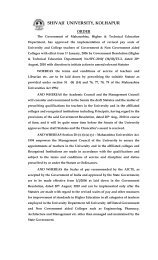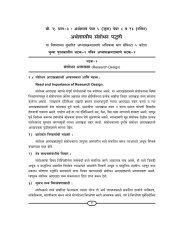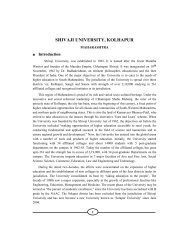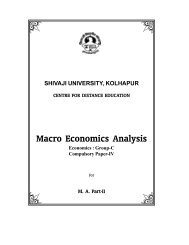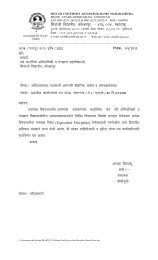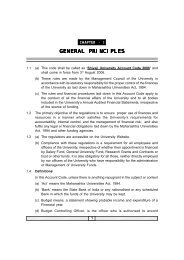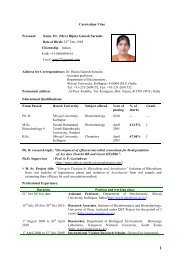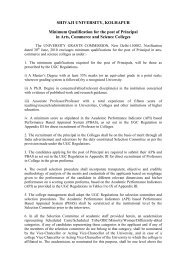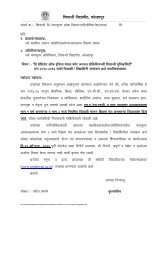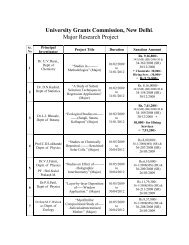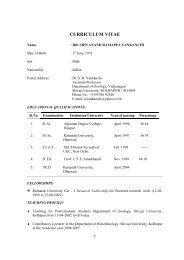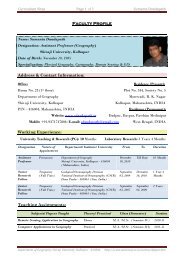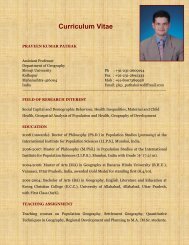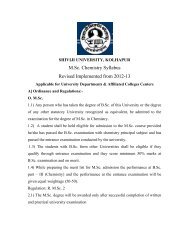Economics(Paper-4) - Shivaji University
Economics(Paper-4) - Shivaji University
Economics(Paper-4) - Shivaji University
Create successful ePaper yourself
Turn your PDF publications into a flip-book with our unique Google optimized e-Paper software.
7) Public Spending : Fiscal policy will be instituted through public expenditure<br />
and economic development can be achieved. Spending on Education may create<br />
qualitative human capital which is necessary for economic development. Alongwith<br />
this spending on health care centre the efficiency of labour force can be enhanced.<br />
During the depression compensatory spending must be undertaken till the private<br />
investment becomes normal. Thus, compensatory spending shall results in raising the<br />
levels of income, output and employment.<br />
8) Taxation : It is an inevitable instrument for raising finance for economic<br />
development. The government may resort both Direct and Indirect taxation to have<br />
adequate revenues for development purposes During inflation higher rate of direct<br />
taxation and lower rate of indirect taxes may useful to poor people. Through this peoples<br />
well being can be maintained at higher level. But at the same time rich class will be hit<br />
hard. Thus, very wisely the taxation policy should be executed to have smooth space of<br />
economic development of a country.<br />
3.2.4 Role of Government in Economic Development :<br />
After a big jolt of great depression 1930, people lost their confidence in market<br />
mechanism Keynes economic models more emphasized that active government<br />
participation is a necessary condition for economic development of an economy.Thus<br />
to tackle various socio-economic problems in an effective way, government intervention<br />
was deemed to be essential. Hence, World Development Report 1997 argues that,<br />
“The state (government) is central to economic and social development not as a direct<br />
provider of growth but as a partner, catalyst and facilator.Al the end the rationale role of<br />
government in economic development in the following way.<br />
1) Capital Formation : The process of economic development in the under<br />
developed countries depends mainly on capital formation. The Government institutes<br />
the monetary and fiscal policy to have a desirable capital formation for economic<br />
development. In other words credit policy, spending and taxing policy launches in such<br />
a way that there will be capital formation.<br />
2) Building Institutions : The effective rate of capital formation is possible if<br />
institutions are powerful. The institutional structure means the banking, education,<br />
insurance and saving organization should be well developed then only capital formation<br />
is possible. Thus, state / government takes an appropriate action to best institution<br />
which in turns helps to achieve higher level of economic development.<br />
3) Infrastructure : Government has to bear the responsibility of developing<br />
infrastructure i.e. power, electricity, irrigation, transport system etc. Huge capital<br />
investment are required to create such facilities, there private sector is reluctant to<br />
spend on this sectors. Thus, government can only invest in such projects. Therefore<br />
government plays an important role in economic development by instituting these<br />
facilities.<br />
123456789012345678901234567890121234567<br />
123456789012345678901234567890121234567<br />
41<br />
123456789012345678901234567890121234567<br />
123456789012345678901234567890121234567<br />
123456789012345678901234567890121234567<br />
123456789012345678901234567890121234567<br />
123456789012345678901234567890121234567<br />
123456789012345678901234567890121234567



